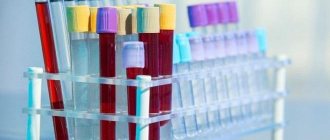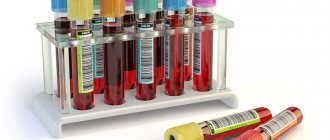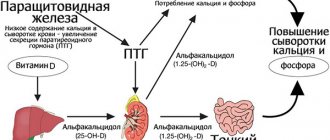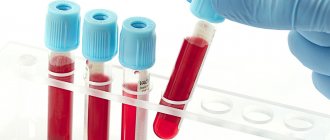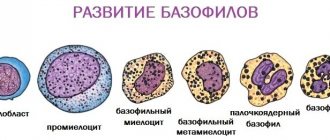Analysis of CA 19-9
The tumor marker CA 19-9 is perceived in combination with the concept of oncological neoplasms.
It is used in the diagnosis, monitoring and early detection of metastasis in the colon and rectum, liver, pancreas, and the stomach itself. In almost all patients with a tumor of the gastrointestinal tract (especially the pancreas), the concentration of CA 19-9 is greatly increased. What is CA 19-9? This is a type of protein called a glycoprotein, and it is produced in the cells of neoplasms, over time it penetrates into the bloodstream and makes it possible to diagnose the presence of a cancerous tumor. Tumor marker data are not used in the primary diagnosis of cancer. The specificity of this antigen is that it cannot be detected in people of Caucasian origin, even in the presence of a large tumor. This can be explained by the genetic characteristics of the inhabitants of this region. They lack Lewis protein, a special blood protein. Considering this fact, we can say that a tumor marker is not a universal method for identifying a cancerous tumor.
Norm
If the normal levels of the HE-4 tumor marker may vary depending on the age category, for example, in women after 50 years the norm is no more than 74.3 poml/l, then the norm of the CA 72-4 antigen in the blood is the same for all patients of different age categories - a value from 0 up to 6.9 U/ml. A study is often prescribed in conjunction with other tumor markers: CA 125, 19-9 and 15-3. The greatest accuracy of this study is demonstrated when diagnosing cancerous tumors of the stomach and pancreas.
We recommend reading: What does the CA 242 tumor marker mean, its meaning and normality?
The level of this antigen may vary depending on the location of the tumor and the stage of its progression. In case of metastasis, the accuracy of the study can be only 25-30%. After successful surgery to remove a cancerous tumor, the levels of the CA 72-4 marker should return to normal within one month.
A one-time study of stomach tumor markers is not able to accurately detect a tumor in the body. If deviations are detected, both upward and downward, the patient must undergo a detailed examination.
Leading clinics in Israel
Assuta
Israel, Tel Aviv
Ikhilov
Israel, Tel Aviv
Hadassah
Israel, Jerusalem
Where can you find this carbohydrate antigen?
This protein can be found in the following organs of the human body:
- Bile ducts;
- Salivary glands;
- Prostate gland;
- Gastrointestinal tract;
- Uterus cells.
Based on this, it can be concluded that obtaining this antigen is permissible from pancreatic secretions, saliva, sperm, and bile. This rather specific protein can be produced even by an unborn baby - its digestive system.
Is preparation necessary?
Antigen Ca 19-9 is sensitive to external and internal environmental factors. Therefore, in order to obtain the closest to the true results, it is necessary to follow the rules of preparation for donating blood for analysis. The day before the examination, you should not eat fried, fatty foods, alcohol or sweets. Strength and psycho-emotional stress stops within one day. Antitumor drugs and agents that affect the activity of the gastrointestinal tract are canceled a week before the study.
Before blood collection, you can only drink water.
On the day of donating blood for the Ca 19-9 tumor marker, you cannot have breakfast; it is better to do the test in the morning; you are only allowed to drink water. You should not smoke in the morning before the test. If it is impossible to stop medications that affect the results of the examination, this must be indicated on the form before taking the examination, because they can change the results of the examination.
Why do you need an analysis for CA 19-9?
Tumor marker testing is used to check the effectiveness of therapeutic measures for pancreatic cancer, and for early detection of cancer relapses.
Also, such a study allows for a distinctive diagnosis of a malignant neoplasm with other diseases (for example, pancreatitis). The concentration of this protein indicates the prevalence of the malignant tumor and the presence of distant metastases. In addition to identifying cancer and monitoring the effectiveness of prescribed therapy, it is advisable to prescribe this test as a preventive measure to those people who have close blood relatives with a medical history of gastrointestinal cancer.
A doctor may recommend a test for the CA 19-9 tumor marker if the following diseases are suspected:
- Inflammatory processes in the gastrointestinal tract or cancerous formations in the gastrointestinal tract;
- Pelvic cancer and breast cancer in women;
- Cholecystitis;
- Cirrhosis of the liver;
- Hepatitis;
- Cystic fibrosis;
- Cholelithiasis.
Thanks to this analysis, it is possible to determine whether it is possible to remove the tumor along with the area of the infected organ - if the indicator exceeds a thousand units per ml, surgical removal is not performed. In such cases, the process of metastasis is already underway and removal of the tumor, as a rule, does not give a positive result. If the indicator is less than a thousand units per ml, surgical intervention makes sense in almost 50% of cases. Relapses of the disease are possible if tumor markers again show a high level within a year after surgery. If the readings decrease, it means that the operation was successful and metastasis has not begun.
Tumor marker feature
This marker often surprises doctors today. CA 19-9, having gained the highest concentrate, does not change its value until the last stage, despite the possible deterioration of the patient’s condition.
Why are the described tests called tumor markers? These mean substances that, unlike other components of the blood, interact with a number of deterministic chemical elements, while working as markers that highlight cancer cells. This is how laboratory staff calculate their concentration. More often the antigen is detected in:
- gallbladder;
- stomach, pancreas;
- epithelium of the gastrointestinal tract (gastrointestinal tract);
- uterine cells;
- salivary gland.
General characteristics:
| Symptoms | Diagnostics | Causes | Treatment |
| · Pain in the abdominal cavity; · nausea; · vomit; · hiccups (contraction of the diaphragm); metabolic disease; · loss of appetite and sudden weight loss; · bloating; · diarrhea; Frequent complaints of fatigue; · hard to swallow; from time to time pancreatic juice splashes into the oral cavity; · iron deficiency anemia (low level of hemoglobin/iron in the patient's body). | · Scanning (tomographic); endoscopic retrograde cholangiopancreatography; magnetic resonance cholangiopancreatography; · various tests (blood, fecal fat, urine, etc.); · esophagogastroduodenoscopy; · endoscopic ultrasound examination; · CT scan; PET-CT study; gastroscopy; ultrasound examination of the abdominal organs; chest x-ray; laparoscopy; transabdominal ultrasonography; endoscopic retrograde pancreaticocholangiography; endoscopic ultrasound; · aspiration biopsy. | · Stomach polyps (moles); stomach ulcer; smoking and drinking alcohol; · inheriting a disease from parents; · excess weight; · Helicobacter pylori (infectious disease); · pernicious anemia; · gastritis; · previous surgical interventions of the stomach; · diabetes; · pancreatitis; Barrett's esophagus; Ménétrier's disease; · jaundice. | · Surgical interventions; · chemotherapy; · radiotherapy. |
Tumor marker CA 19-9 is a cancer antigen present in living organisms. An increase in marker concentration may confirm the appearance of cancer. Remember, pancreatic and gastrointestinal cancer can develop at an unrealistic speed and reach large sizes in short periods of time. According to statistics, mortality due to this disease ranks fourth. At the same time, both older people and young people (boys, girls, children) are susceptible to cancer.
An interesting fact: people (mostly of Caucasian nationality) who do not have the gene responsible for the Lewis protein show immunity to this type of tumor.
Attention! On average, the price for taking the CA 19-9 test is 850 rubles. According to the rules for collecting blood, eight and a half milliliters of “red liquid” are taken for analysis. Blood is drawn into a vacutainer with separating gel.
When is a tumor marker test necessary?
This examination is prescribed if there is a suspicion of a cancerous tumor in the pancreas, if symptoms associated with this disease appear:
- Nausea;
- Jaundice;
- Weight loss;
- Abdominal pain.
It is also recommended to carry out analysis if cancerous tumors are suspected in the liver, gallbladder, stomach, or large intestine. This test is also periodically prescribed to patients who initially have high levels of glycoprotein and to those who are receiving appropriate treatment for cancer.
Indications for cancer antigen testing
The study is prescribed to women in the following cases:
- the patient complains of manifestations of pancreatic cancer,
- the clinical picture indicates a high probability of a tumor process in the stomach, liver, gall bladder and ducts, and colon. Additionally, other studies and tests are needed, including for tumor markers of squamous cell carcinoma,
- during the treatment of malignant pathologies of the gastrointestinal tract, to assess the effectiveness of treatment for pancreatic cancer.
Carbohydrate antigen is the second most important marker in the complex diagnosis of pancreatic carcinoma. The study is prescribed if the gastroenterologist suspects the development of not only a malignant process, but also inflammation of the pancreas (pancreatitis).
The price of analysis for CA 199 is quite high: 860 rubles + sampling of biomaterial from a vein (about 150 rubles). The cost of the study varies depending on the region and the level of the clinic. The best option is to contact a laboratory that uses high-tech equipment (the latest generation analyzers) and modern blood testing methods.
Preparing to donate blood at CA 19-9
It is recommended not to smoke half an hour before taking blood for CA 19-9.
Try to avoid drinking alcohol for at least 24 hours. You should not eat fatty, fried foods, or take medications. There is no need to exhaust yourself with physical work and sports activities on the day of the test. If it is not possible to stop taking any medication, you should inform your doctor and laboratory technician about this. The diagnostic value of this analysis increases with simultaneous research on CEA. Also, to make the most accurate diagnosis and prescribe the necessary treatment for cancer, it is recommended to take tests for the concentration of CA 72-4, total bilirubin, CA 242. Blood sampling is usually carried out from 7 a.m. to 11 a.m.
Today, pancreatic cancer is occurring more and more often, even at a young age; after thirty years of age, such a risk can already arise. This pathology is one of the most poorly diagnosed and difficult to treat diseases. That is why it is so important to diagnose this disease in time and begin oncology treatment in a timely manner. This is why there are tumor markers, the purpose of which is to identify the disease at the very beginning of the path. CA 19-9, despite the fact that it cannot be used to diagnose the initial stages of the disease, remains the most sensitive and most informative for assessing the disease. CA 19-9 is considered the initial diagnostic criterion for making a diagnosis.
Start of research
When is a blood test prescribed? Typically, specialists in hospitals and clinics prescribe it for established reasons:
- for a complete study of the human body;
- if the patient's complaints are similar to the symptoms of this tumor.
The CA 19-9 antigen test is taken from the antecubital vein. Clear preparation will be required:
- Do not eat food for eight hours before the test; only non-carbonated water is acceptable.
- Do not take medications the day before the test.
- Do not use nicotine before taking the test (at least thirty minutes).
- Try not to experience mental or physical stress.
If you do not take into account the conditions of the analysis, the readings may be false!
Mistakes made by patients:
- Most people, seeing negative tumor marker test results (CA 19-9 elevated), immediately react skeptically and begin to worry greatly. This is one of the most common mistakes of humanity: stress fundamentally affects the patient’s condition and the further development of oncology.
- You should not indulge in self-medication, go to self-proclaimed witches or “non-doctors”. This will only make the situation worse. Moreover, both treatment and such therapy will cost much more.
- You should not neglect the advice and prescriptions of doctors, even if they are expensive. Remember, you will always have time to earn money, and health is not credited to bank cards!
- You should not carry out treatment according to the conditions of various sites without the recommendations of the attending physician.
- Take only medications prescribed by your doctor. Even if the pharmacist at the pharmacy advises you to buy similar or additional drugs.
- Take medications exactly as prescribed!
What do the CA 19-9 indicators say?
With cancer in the pancreas, high levels of glycoprotein are shown. Conducting studies of this tumor marker, the permissible readings of which are within 10 units/ml, are needed when diagnosing carcinoma and assessing the possibility of using surgery. When CA 19-9 readings are above a thousand units per ml, a cancerous tumor is considered operable in a minimum number of patients - about 5% of patients. If the tumor marker reading is below this figure, the tumor can be removed with a greater chance of a good prognosis. But after surgical removal, there is a risk of relapse within one to seven months.
Note! CA 19-9 is considered second in importance after CEA for diagnosing a malignant tumor in the stomach.
In addition, the study of high molecular weight glycoprotein is prescribed in addition to alpha-fetoprotein when diagnosing and monitoring the treatment of tumors of the gallbladder and liver.
Doctors say that it is unrealistic to make a correct diagnosis based only on the results of studies on CA 19-9. The results of this analysis should not be used to determine the extent of surgery.
Preparing for blood collection
Women should know: violation of even one of the points leads to false positive results and unnecessary worry when identifying inflated indicators. The rules for preparing for venous blood collection are simple.
How to proceed:
- during the day before the tumor marker test, you should not drink all types of alcoholic beverages, eat fatty and fried foods, exercise,
- eating in the evening 810 hours before the visit to the laboratory,
- blood from a vein is donated strictly on an empty stomach,
- Smoking is prohibited for three to four hours before the analysis.
Important! Before taking blood, you should not take medications of any kind. If it is impossible to refuse to receive pills or injections for medical reasons, then you need to warn your doctor about this nuance. Patients with chronic pathologies of blood vessels, heart, and hypertensive patients need to come to the laboratory early: before 78 hours, in order to donate blood early, take the next dose of medicine after the analysis.
When CA 19-9 values exceed normal
An increase in the level of glycoprotein can occur against the background of inflammation and benign tumors in the digestive system and in the liver - often up to one hundred units per ml, but in special cases it can reach up to five hundred units per ml. This increase in glycoprotein content also occurs in cystic fibrosis. In the first option, the concentration can be increased in 12% of patients. The glycoprotein is usually excreted in bile. In connection with this process, cholestasis is accompanied by an increase in data on the level of CA 19-9. In such cases, gamma-glutamate transferase and alkaline phosphatase studies are performed simultaneously. An increase in CA 19-9 data can also occur against the background of tumors in another area (colorectal cancer, ovarian tumors, liver cirrhosis, spleen cancer, hepatitis).
How is it carried out?
To determine tumor markers, venous blood is needed. To do this, the subject must sit or lie down. The patient should not move the arm from which blood is being drawn. 5 ml of blood is drawn into a sterile syringe and placed in a clean test tube, which is then sent to the laboratory. Special refrigerators are used for preservation. The study of the biomaterial itself is carried out by ELISA or chemiluminescence immunoassay (CHLA), which is characterized by a high level of specificity and sensitivity, as well as a short time to obtain results. The essence of the method is the ability to accumulate molecules of phosphors - substances that emit visible light in the UV spectrum. The luminescence level is determined by lumenometers. A blood test using ELISA takes 10-16 days, and ELISA takes 24 hours.
Interpretation of tumor marker analysis
Normal values, within the normal range, are considered to be the level of cancer antigen from zero to 0.35 units/ml. This level is considered normal for both men and women; it does not change depending on the age of the person taking the test. A high level of glycoprotein indicates the presence of cancer in the pancreas - the higher the reading, the more advanced the stage of pathology is present in the body. A very high level of the CA 19-9 marker indicates the presence of metastases. But even with a high reading of this antigen, there is no need to panic; sometimes high readings simply indicate inflammatory processes in the body, which do not at all relate to the formation of malignant tumors.
Remember! Testing for CA 19-9 levels is important for the early detection of metastatic cancer tumors in the pancreas.
If the interpretation of the results of the examination for CA 19-9 is in doubt, then a repeat test is prescribed, which is taken in the same place and under the same conditions. And also in this case, it would be appropriate to use additional examination methods - ultrasound, MRI, x-ray, biopsy.
But an irrefutable fact can be considered the relationship between the tumor marker level and the stage of the disease (tumor size).
If the concentration of the CA 19-9 antigen is approximately one hundred units per ml, this signals the presence of problems with the gastrointestinal tract or indicates the onset of oncology. Usually, with such values, obvious symptoms are not yet visible.
If a blood test shows data within 200 units/ml, this means that additional examinations are required for the presence of a cyst in the pancreas.
Tumor markers for women
The ovaries, uterus, and mammary glands can become infected with a tumor. To identify oncology, tests for tumor markers are used:
- CA 125 - it is used to detect ovarian tumors. In the fetus it is present in the cells of the gastrointestinal tract. Large elevated concentrations are detected in the blood cells of fertilized women and in breast milk. In adults, it is formed in the epithelium of the respiratory tract.
- Cancer embryonic antigen (CEA) – for suspected cancer of the rectum, colon, lungs, mammary glands, gastrointestinal epithelium.
- CEA (tumor-embryonic antigen) is produced in the tissues of the fetal gastrointestinal tract and is detected in the child’s blood, like glycoprotein.
- SCC – with its help, cervical carcinoma is detected and examined.
- MSA is an analysis for detecting breast cancer.
- CA 72-4 – prescribed for suspected ovarian tumor.
- NSE - is being studied in leukemia, lung oncology and neuroblastoma.
- CYFRA 21-1 – it is used to study bladder carcinoma.
- HCG is used to calculate most types of tumors: stomach, uterus, kidneys, ovaries.
Research is carried out for:
- Prevention (according to the rules, it is worth checking for the presence of the disease annually).
- Diagnostics (if there are suspicions of oncological, non-oncological diseases of the gastrointestinal tract or pancreas).
- Observations (if the patient has a gastrointestinal tumor, it is necessary to monitor the development of the disease).
- Obtaining information about the efficiency of the procedures performed (an oncology patient is analyzed after a specific period of time after therapy to check for improvements).
The study requires consultations with doctors: mammologist, gynecologist, therapist, oncologist, surgeon. Based on the results of marker tests, it is impossible to clearly determine the presence of a tumor in a woman, since they may indicate non-oncological diseases. Doctors are supposed to monitor the patient's condition.
Pregnancy
What to do if a pregnant woman is diagnosed with a malignant disease (tumor) of the pancreas or gastrointestinal tract? Most girls aged 17-35 can get pregnant safely and then give birth to a healthy child. From the first days of pregnancy, a woman makes an appointment with doctors. Doctors prescribe a series of tests.
If the tests are unsatisfactory, the girl will be sent for a full diagnosis. If tests for a tumor are indicated, the doctor may prescribe additional blood tests (tumor markers). Accordingly, an analysis will be performed for the tumor marker CA 19-9 and others.
When there is enough research to diagnose a tumor of the pancreas or gastrointestinal tract, the woman will be immediately sent for termination of pregnancy. At the same time, with a tumor and pregnancy, you can lose two living people at once: both the mother and the child. Leaving the fetus is extremely dangerous!


